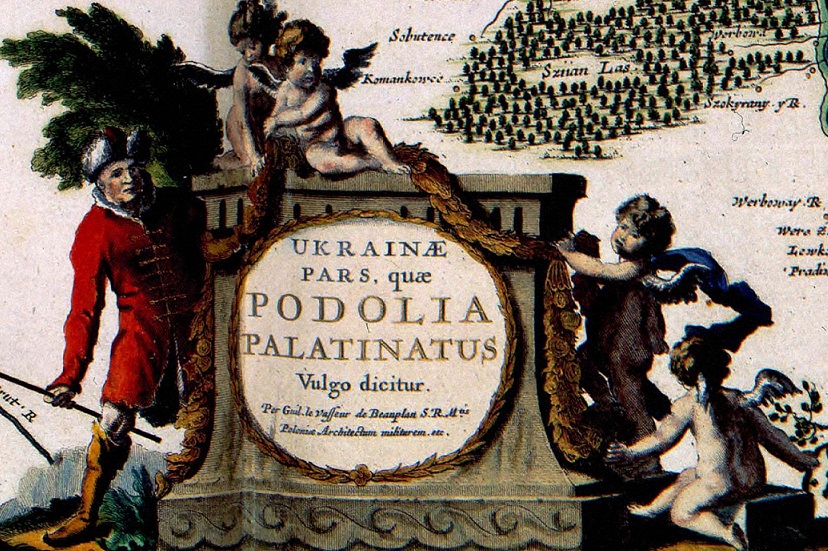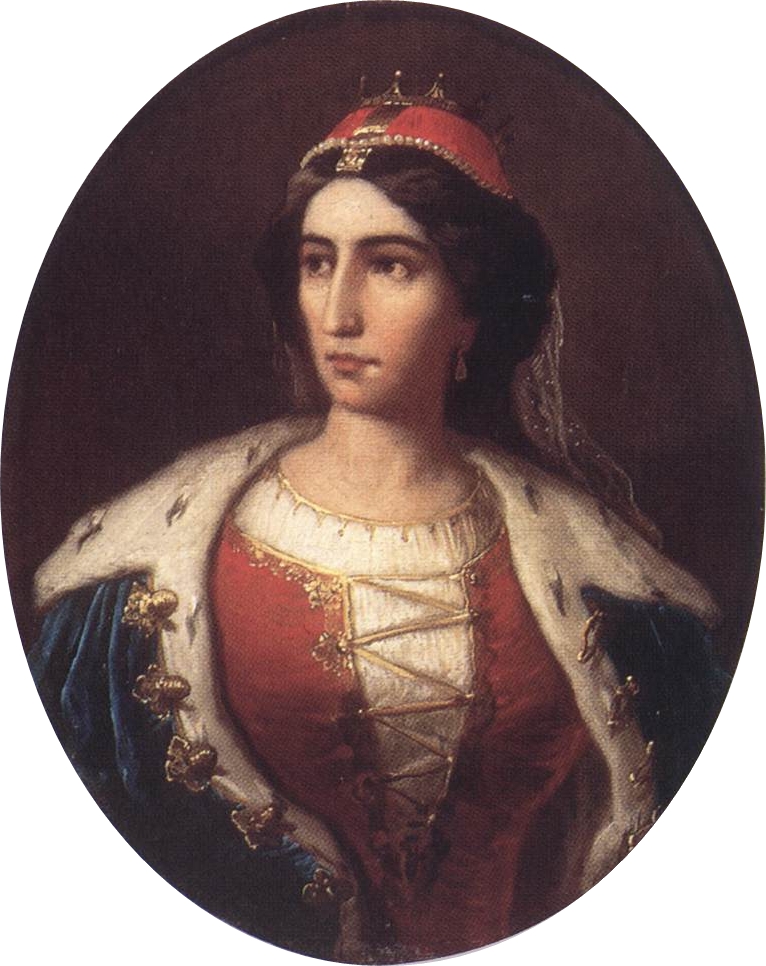|
Fyodor Koriatovych
Fedir Koriatovych also spelled Theodor Koriatovits ( uk, Федір Коріятович, lt, Teodoras Karijotaitis) (died 1414 in Mukachevo) was a Podolian prince from a Ruthenian branch of the Gediminids dynasty in what is now Ukraine. Son of Karijotas. Fedir inherited Navahrudak Castle from his father. After Grand Duchy of Lithuania gained Podolia as a result of the decisive victory against the Golden Horde at the Battle of Blue Waters in 1362, he with his three brothers were appointed by Grand Duke Algirdas to administrate the region. After the last of his brothers died circa 1389, he remained the sole administrator of Podolia for three years until his exile by the Grand Duke Vytautas the Great. In 1392 he disobeyed Vytautas the Great and was forced into exile. In 1396, Koriatovych purchased the city of Munkács in the Kingdom of Hungary (today Mukachevo, Ukraine), settling himself in the city's Palanok Castle, which would become one of the most protected castles in the reg ... [...More Info...] [...Related Items...] OR: [Wikipedia] [Google] [Baidu] |
Duchy Of Podolia
Duchy of Podolia ( uk, Подільське князівство, pl, Księstwo podolskie) was a historical state that previously was a part of Kingdom of Galicia–Volhynia. The principality of Southwest Galicia–Volhynia, which was formed as a result of the struggle for the legacy of the Kingdom of Galicia–Volhynia. Founded by Knyaz George Koriatovich from the Karijotas house. Following the 14th century partition of the Kingdom between the Kingdom of Poland and the Grand Duchy of Lithuania during the Galicia–Volhynia Wars, in 1366 Yuriy Koriatovich of Gediminids along with his brother succeeded in unknown way over the duchy as vassal of the Polish crown. In 1377 the duchy became a fiefdom after the King of Hungary Louis I of Hungary conducted a military raid on Ruthenian lands. After the death of King Louis, the Koriatovich brothers took active participation in electing Jogaila as King of Poland, yet kept their fief loyalty to the King of Hungary. After a conquest of Podol ... [...More Info...] [...Related Items...] OR: [Wikipedia] [Google] [Baidu] |
Podolia
Podolia or Podilia ( uk, Поділля, Podillia, ; russian: Подолье, Podolye; ro, Podolia; pl, Podole; german: Podolien; be, Падолле, Padollie; lt, Podolė), is a historic region in Eastern Europe, located in the west-central and south-western parts of Ukraine and in northeastern Moldova (i.e. northern Transnistria). The name derives from Old Slavic ''po'', meaning "by/next to/along" and ''dol'', "valley" (see dale). Geography The area is part of the vast East European Plain, confined by the Dniester River and the Carpathian arc in the southwest. It comprises an area of about , extending for from northwest to southeast on the left bank of the Dniester. In the same direction run two ranges of relatively low hills separated by the Southern Bug, ramifications of the Avratynsk heights. The Podolian Upland, an elongated, up to high plateau stretches from the Western and Southern Bug rivers to the Dniester, and includes hill countries and mountainous regions ... [...More Info...] [...Related Items...] OR: [Wikipedia] [Google] [Baidu] |
1414 Deaths
Year 1414 ( MCDXIV) was a common year starting on Monday (link will display the full calendar) of the Julian calendar. Events January–December * January 7 – Michael Küchmeister von Sternberg becomes the 28th Grand Master of the Teutonic Order. * May 28 – Khizr Khan (Timur's governor of Multan) takes the Delhi Sultanate from Daulat Khan Lodi, founding the Sayyid Dynasty. * August 6 – Joanna II succeeds her brother Ladislaus, as Queen of Naples. * November 16 – The Council of Constance begins in order to end the western schism. Date unknown * Ernest, Duke of Austria (head of the Leopoldian line of the House of Habsburg) is the last duke to be enthroned in the Duchy of Carinthia, according to the ancient Carantanian ritual of installing dukes at the Prince's Stone; he adopts the title of Archduke. * Alien priory cells are suppressed in England. * The Tibetan lama Je Tsongkhapa, of the Gelug school of Buddhism, declines the offer of the Yong ... [...More Info...] [...Related Items...] OR: [Wikipedia] [Google] [Baidu] |
Polski Słownik Biograficzny
''Polski Słownik Biograficzny'' (''PSB''; Polish Biographical Dictionary) is a Polish-language biographical dictionary, comprising an alphabetically arranged compilation of authoritative biographies of some 25,000 notable Poles and of foreigners who have been active in Poland – famous as well as less-well-known persons – from Popiel, Piast Kołodziej, and Mieszko I, at the dawn of Polish history, to persons who died in the year 2000. The ''Dictionary'', published incrementally since 1935, is a work in progress. It currently covers entries from A to S and its completion is expected about 2030. The PSB is, by its own assessment, "at present... one of the world's leading biographical publications." Outside Poland, it is available at the British Library, the Library of Congress, the Vatican Library, the Hoover Institution on War, Revolution and Peace, the University of California at Berkeley, Stanford University Stanford University, officially Leland Stanford Junior Univ ... [...More Info...] [...Related Items...] OR: [Wikipedia] [Google] [Baidu] |
NASU Institute Of History Of Ukraine
Institute of History of Ukraine is a research institute in Ukraine that is part of the National Academy of Sciences of Ukraine department of history, philosophy and law and studies a wide spectrum of problems in history of Ukraine. The institute is located in Kyiv. History The institute was established on the decision of the Central Committee of the Communist Party of Ukraine on July 23, 1936, and the Presidium of Academy of Sciences of the Ukrainian SSR on July 27, 1936, based on several departments and commission of the academy and the All-Ukrainian Association of Marx-Lenin Institutes (VUAMLIN). Original it was composed of three departments: history of Ukraine in feudalism epoch, history of Ukraine in epoch of capitalism and imperialism, and history of Ukraine in Soviet period. After the Soviet annexation of eastern Poland during the World War II, in Lviv, Western Ukraine was established a branch of the institute, which was headed by Ivan Krypiakevych. After the war in 1946, t ... [...More Info...] [...Related Items...] OR: [Wikipedia] [Google] [Baidu] |
Palanok Castle
The Palanok Castle or Mukachevo Castle ( uk, Замок "Паланок", Zamok "Palanok"; hu, Munkács vára or ; german: Plankenburg) is a historic castle in the city of Mukacheve in the western Ukrainian oblast (province) of Zakarpattia. The Palanok Castle is delicately preserved,myukraine.info — Mukachevsky "Palanok" Castle and is located on a 68 metre high former volcanic hill. The castle complex consists of three parts: the high, middle, and low castle.ukrainainkognita.org.ua — Mukachevskyi zamok "Palanok" Part 1 History |
Vytautas The Great
Vytautas (c. 135027 October 1430), also known as Vytautas the Great ( Lithuanian: ', be, Вітаўт, ''Vitaŭt'', pl, Witold Kiejstutowicz, ''Witold Aleksander'' or ''Witold Wielki'' Ruthenian: ''Vitovt'', Latin: ''Alexander Vitoldus'', Old German: ''Wythaws or Wythawt'') from the late 14th century onwards, was a ruler of the Grand Duchy of Lithuania. He was also the Prince of Grodno (1370–1382), Prince of Lutsk (1387–1389), and the postulated king of the Hussites. In modern Lithuania, Vytautas is revered as a national hero and was an important figure in the national rebirth in the 19th century. ''Vytautas'' is a popular male given name in Lithuania. In commemoration of the 500-year anniversary of his death, Vytautas Magnus University was named after him. Monuments in his honour were built in many towns in the independent Lithuania during the interwar period from 1918 to 1939. It is known that Vytautas himself knew and spoke in the Lithuanian language with Jogaila. ... [...More Info...] [...Related Items...] OR: [Wikipedia] [Google] [Baidu] |
Battle Of Blue Waters
The Battle of Blue Waters ( lt, Mūšis prie Mėlynųjų Vandenų, be, Бітва на Сініх Водах, uk, Битва на Синіх Водах) was a battle fought at some time in autumn 1362 or 1363 on the banks of the Syniukha river, left tributary of the Southern Bug, between the armies of the Grand Duchy of Lithuania and the Golden Horde. The Lithuanians won a decisive victory and finalized their conquest of the Principality of Kiev. Background After the death of its ruler Berdi Beg Khan in 1359 the Golden Horde experienced a series of succession disputes and wars that lasted two decades (1359–81). The Horde began fracturing into separate districts (''ulus''). Taking advantage of internal disorder within the Horde, Grand Duke Algirdas of Lithuania organized a campaign into Tatar lands. He aimed to secure and expand southern territories of the Grand Duchy of Lithuania, particularly the Principality of Kiev. Kiev had already come under semi-Lithuanian control after ... [...More Info...] [...Related Items...] OR: [Wikipedia] [Google] [Baidu] |
Navahrudak Castle
The former castle in Navahrudak, Belarus ( be, Навагрудскі замак, lt, Naugarduko pilis, pl, Zamek w Nowogródku) was one of the key strongholds of the Grand Duchy of Lithuania, cited by Maciej Stryjkowski as the location of Mindaugas's coronation as King of Lithuania as well as his likely burial place.Tomas BaranauskasМесто коронации Миндаугаса On the opinion of Lithuanian historians (Tomas Baranauskas, T.Baranauskas etc.), there is no information that King Mindaugas lived or visited Navahrudak at all - it is Maciej Stryjkowski, Maciej Stryjkowski's XVI century written unargued conjecture in the interpretation of legends. [...More Info...] [...Related Items...] OR: [Wikipedia] [Google] [Baidu] |
Spytko II Of Melsztyn
Spytek of Melsztyn ( or ) was a Polish nobleman ( szlachcic) of the Leliwa coat of arms. Spytek was owner of Melsztyn estates. He served as Court Marshal since 1373, voivode of Kraków Voivodeship since 1381, starosta of Biecz since 1383 and Kraków since 1390. Continuing the idea of Władysław I Łokietek he initiated the marriage of Queen Jadwiga of Poland and Grand Duke of Lithuania – to become king of Poland – Władysław II Jagiełło. In 1391–1396 Spytek reclaimed the Land of Wieluń and Orzeszków from Prince Władysław Opolczyk. On 13 June 1395 the King gave Spytek a part of Podolia as fief, Queen Jadwiga confirmed this on 10 July 1395. During the brief period when he was Duke of Podolia, he succeeded lead to the resignation Fyodor Koriatovych of the rights to Podolia and with Queen and King negotiated with Sigismund of Luxembourg (then King of Hungary) the border issue; and with the Bishop of Vilnius tried to prevent the secession of Lithuania from Polish– ... [...More Info...] [...Related Items...] OR: [Wikipedia] [Google] [Baidu] |


